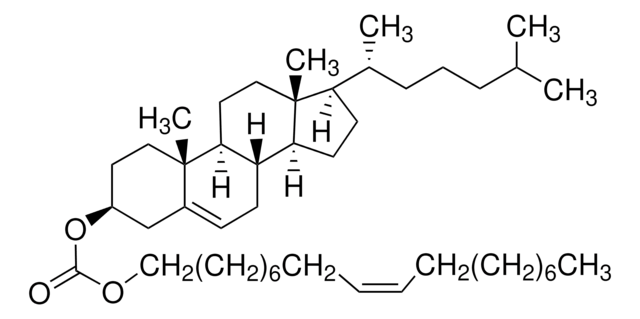C8753
Cholesteryl arachidonate
≥95% (HPLC; detection at 205 nm), viscous liquid
Synonym(s):
3β-Hydroxy-5-cholestene 3-arachidonate, 5-Cholesten-3β-ol 3-arachidonate, Cholesteryl eicosatetraenoate
About This Item
Recommended Products
Assay
≥95% (HPLC; detection at 205 nm)
form
viscous liquid
color
clear
functional group
ester
shipped in
dry ice
storage temp.
−20°C
SMILES string
CCCCC\C=C\C\C=C\C\C=C\C\C=C\CCCC(=O)OC1CCC2(C)C3CCC4(C)C(CCC4C3CC=C2C1)C(C)CCCC(C)C
InChI
1S/C47H76O2/c1-7-8-9-10-11-12-13-14-15-16-17-18-19-20-21-22-23-27-45(48)49-40-32-34-46(5)39(36-40)28-29-41-43-31-30-42(38(4)26-24-25-37(2)3)47(43,6)35-33-44(41)46/h11-12,14-15,17-18,20-21,28,37-38,40-44H,7-10,13,16,19,22-27,29-36H2,1-6H3/b12-11+,15-14+,18-17+,21-20+
InChI key
IMXSFYNMSOULQS-SXXSVFILSA-N
Application
Biochem/physiol Actions
Preparation Note
Storage Class Code
10 - Combustible liquids
WGK
WGK 3
Flash Point(F)
Not applicable
Flash Point(C)
Not applicable
Personal Protective Equipment
Certificates of Analysis (COA)
Search for Certificates of Analysis (COA) by entering the products Lot/Batch Number. Lot and Batch Numbers can be found on a product’s label following the words ‘Lot’ or ‘Batch’.
Already Own This Product?
Find documentation for the products that you have recently purchased in the Document Library.
Articles
Cholesterol esterification enhances transport efficiency in lipoproteins for increased blood stream transport.
Cholesterol esterification enhances transport efficiency in lipoproteins for increased blood stream transport.
Cholesterol esterification enhances transport efficiency in lipoproteins for increased blood stream transport.
Cholesterol esterification enhances transport efficiency in lipoproteins for increased blood stream transport.
Our team of scientists has experience in all areas of research including Life Science, Material Science, Chemical Synthesis, Chromatography, Analytical and many others.
Contact Technical Service







